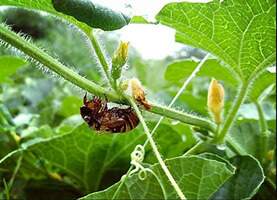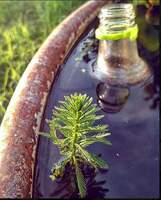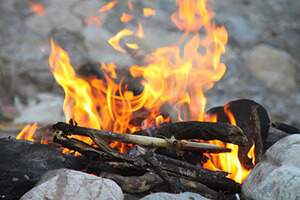Indigenous Permaculture Training

- Info Sessions: Jan 30 and Feb 12, 2020. 6 PM at the Chota Room in the Cherokee Cassino.
- Applications Open: Now
- Deadline to Apply: Applications will be selected on a rolling basis
- Training Dates: March 7, March 14-21, March 28
- Kids Camp Instructors Needed
- Code:00-PRO-EDU-OS
Restoring & Reclaiming Indigenous Agriculture project- restorative agriculture through permaculture design
Northeastern State University's Center for Tribal Studies (CTS) has received funding through the Native American Agriculture Fund for its Restoring and Reclaiming Indigenous Agriculture Project. CTS has partnered with the American Indian Resource Center, Oklahoma Farmers and Ranchers Association, Pawnee Nation College, Tahlequah Farmers Market and the Tahlequah Community Garden.
The project will combine mainstream permaculture design curriculum with indigenous knowledge and practice. Food sovereignty and our traditional foods, are salient pillars of holistic well-being for our communities, our cultural lifeways, spiritual connections, and our tribal sovereignty. The project will combine mainstream permaculture design curriculum with Indigenous knowledge and practice. Participants will learn food and nutritional considerations for holistic health and well-being within an Indigenous context. Indigenous knowledge holders will share traditional ecological knowledge regarding traditional foods, including culturally-appropriate planting and harvesting practices.
The goal is to provide aspiring and amateur American Indian farmers training in permaculture design, with an emphasis on traditional/Indigenous practices. Participants will strengthen their [re]connection to cultural knowledge as it relates to the development of gardens/farms, traditional foods, sustainability, and food sovereignty. The project will increase participants awareness and understanding of job opportunities in permaculture design, agritourism, and economic opportunities in Indigenous foods initiatives/restaurants.
There will be two information sessions (Jan. 30th and Feb. 12th) to answer any questions that potential participants may have. Information sessions will take place at the Cherokee Casino in the Chota Conference Center in Tahlequah, OK at 6 PM. Reserve your spot for the information session.
There is an application process for being selected as there are a limited number of spots available for the training. A link to the application form is found on this page. Applications will be selected on a rolling basis. Once all spots are filled there will be a waiting list.
For the selected participants, there will be an eight-day intensive residential training that will take place at Camp Sevenstar on Lake Tenkiller (March 14-21), with two additional training days on NSU's Tahlequah campus (March 7th and March 28th). At the March 28th meeting, participants will present their final project, a permaculture design for one of the identified sites. The seminar will be led by a certified Permaculture Design instructor, along with two Indigenous permaculture design mentees (one Hunkpapa Lakota, the other Choctaw/Puerto Rican). This intensive course will cover twelve basic areas of the permaculture design history, methodology, and process. The permaculture design curriculum will be supplemented with presentations from local Tribal community experts for cultural context and reference.
Participants will have the option of staying on site for the eight-day training at no cost. Meals will be provided for all participants. Should selected participants require care for school-age children, Kids Day Camp daytime activities will be provided. Participants that complete the entire 10 day curriculum will receive a permaculture certification (American Indian participants receive a $500 stipend). Ages 16 and older that fit the intended goal above are encouraged to apply.
The course is very intensive and requires commitment to participating in all of the curriculum. The program is structured to be a residential camp with participants staying on-site in either Male or Female dorm accommodations. Selected young people under the age of 18 would be required to stay the duration of the camp (March 14-21) unless alternative arrangements are made.
We are also looking for current NSU students to be Kids Camp Instructors for the intensive residential portion of the program. The application to be an instructor for children is found on this page.
Picture credit goes to Divine Earth Gardening Project https://www.divinearthgp.com/)




